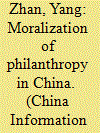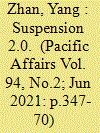|
|
|
Sort Order |
|
|
|
Items / Page
|
|
|
|
|
|
|
| Srl | Item |
| 1 |
ID:
181918


|
|
|
|
|
| Summary/Abstract |
Previous studies on disaster aid emphasize on how aid as gift forms hierarchical relations and thus perpetuates political and symbolic domination. This article, however, highlights the diverse possibilities and capabilities emerged in disaster aid. Based on a 15-month fieldwork, the authors focus on the ethnic minority Qiang’s post-earthquake experience throughout the unprecedented aid and state-sanctioned ‘Gratitude Education’ campaign. This article argues that the moral obligations of gratitude enabled the Qiang’s competition for tourism, education, and other public service resources despite submitting to a seemingly imbalanced power relation in the multi-ethnic region of southwest China. The article further argues that ethnic governance in China is structured on the entanglement of gift exchanges, state control, inter-ethnic competition, and the in-betweeness of ethnic members, which can be problematic yet productive.
|
|
|
|
|
|
|
|
|
|
|
|
|
|
|
|
| 2 |
ID:
173794


|
|
|
|
|
| Summary/Abstract |
Neo-liberalism shifts social responsibility to individuals. The practice of neo-liberal governmentality in China confirms this worldwide trend. This is evident when government retreats from the responsibilities of providing social welfare for rural migrant workers and leaves them to privately funded philanthropy programmes. However, the Chinese case also presents an anomaly in that the shifting of responsibilities under neo-liberalism results not only in individualization, but also in mutual obligations created by moralization. This article explores philanthropy programmes in migrant settlements in contemporary Beijing within a larger neo-liberal context. It provides an ethnographic account of the moralization process informed by the culturally specific notion of aixin (爱心), or loving heart. I argue that moralization within philanthropy programmes is crucial in reconfiguring the modes of responsibility in post-socialist China. Here, social obligations and consolidation of old hierarchies and social inequalities go hand in hand with social individualization.
|
|
|
|
|
|
|
|
|
|
|
|
|
|
|
|
| 3 |
ID:
178757


|
|
|
|
|
| Summary/Abstract |
Since the late 2000s, many rural-to-urban migrants in China have lost their rural land to development plans, resettled in designated areas, and acquired formal urban residency. They stopped migrating, and have apparently ended their life of “suspension,” namely protracted mobility. While most existing research literature on this population foregrounds the issue of land dispossession, this article argues that, following resettlement, these former migrants’ lives can be more accurately characterized as a state of suspension instead of dispossession. Many resettled young adults, while having secured livelihood thanks to state compensation, are excluded from the technology- and capital-intensive developments to which they have lost their land. Some of these young people instead became petty speculators and rentier capitalists by liquidating their compensated assets through mortgages, private lending, rent, and other financial means. They are constantly waiting for the next investment opportunity and windfall gain. Although physically settled down and economically secure, they remain anxious and unsettled. They continue to orient their lives towards an elusive future rather than striving to transform the here and now, thus living in a state that I call “suspension 2.0.”
|
|
|
|
|
|
|
|
|
|
|
|
|
|
|
|
|
|
|
|
|